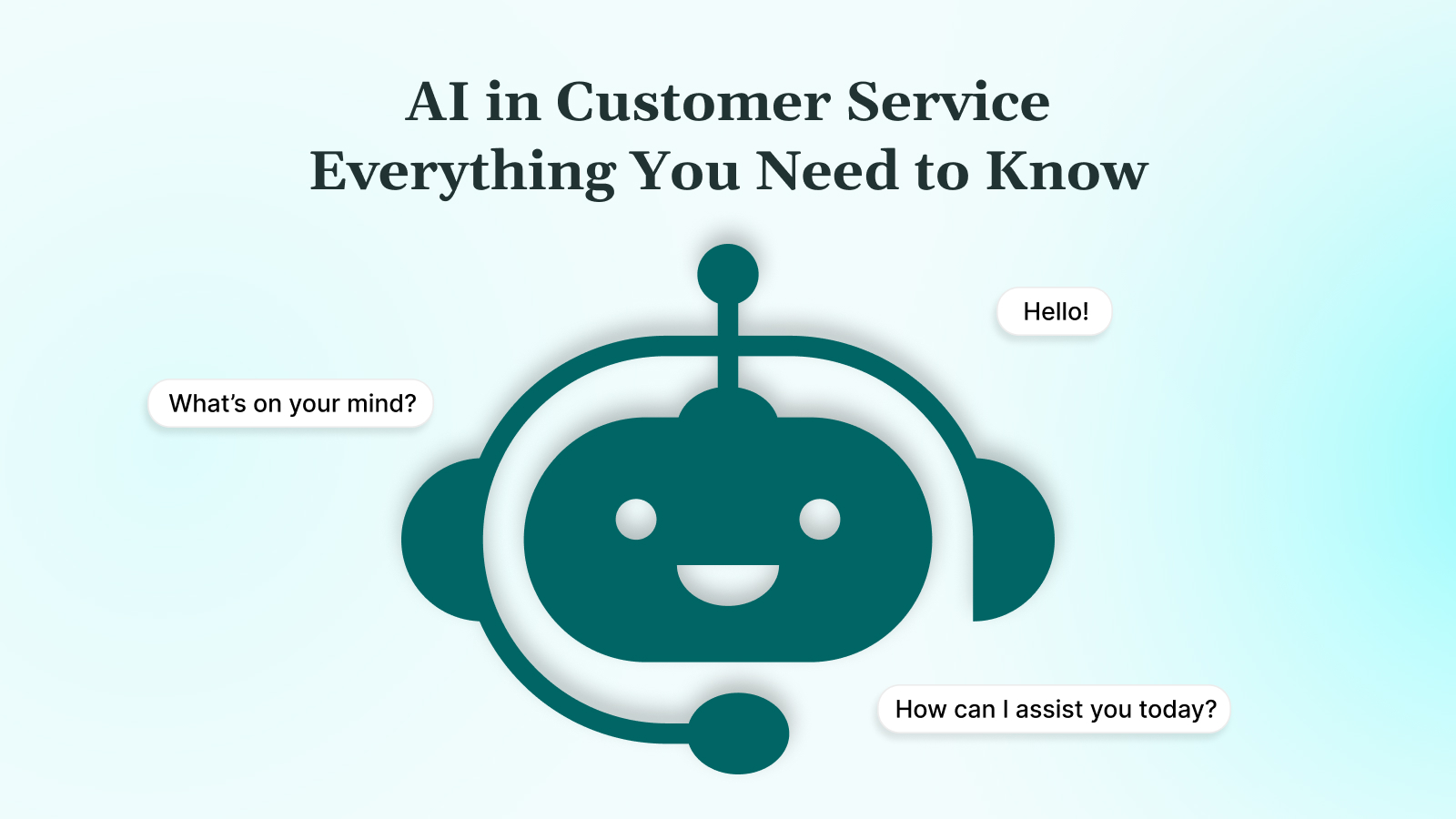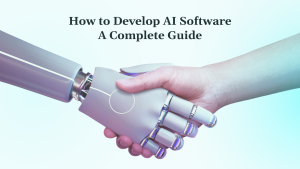In 2025, a staggering 95% of customer interactions are now AI-assisted, with chatbots handling up to 86% of inquiries without human intervention. This shift is not just about automation; it is about delivering faster, more personalized, and efficient support at scale.
Companies adopting AI customer service solutions are already seeing significant benefits. For instance, Microsoft reported saving approximately $500 million by integrating AI into its call centres.
This blog covers the essentials of AI customer service solutions, exploring their capabilities, benefits, and real-world applications.
Key Takeaways
- AI tools like chatbots and AI agents streamline customer service by handling both simple and complex queries, reducing the load on human agents.
- AI automates routine tasks, allowing businesses to manage more interactions with fewer resources, while human agents focus on complex issues.
- AI utilizes customer data to deliver personalized experiences and predict needs, addressing issues before they arise.
What is AI in Customer Service?
AI in customer service refers to the use of intelligent software to automate, optimize, and personalize interactions between businesses and their customers. This includes everything from chatbots that handle basic inquiries to AI agents that can resolve complex customer issues in real time.
Core Technologies Behind AI Customer Service Solutions
To understand how AI is transforming customer service, it is essential to explore the core technologies that power AI customer service solutions:
Natural Language Processing (NLP)
NLP allows AI systems to understand and generate human language. By processing text and speech, NLP enables AI to interpret customer queries, detect emotions, and respond in a way that feels natural and human-like.
Machine Learning (ML)
Machine Learning is at the heart of many AI customer service tools. ML algorithms enable AI to learn from past customer interactions, improving its ability to predict customer needs and provide relevant responses. As these systems are exposed to more data, they become better at handling increasingly complex tasks.
Predictive Analytics
AI uses predictive analytics to anticipate customer needs and behaviors by analyzing past data. For instance, it can foresee when a customer may need a subscription upgrade or when a product requires maintenance. By proactively addressing these potential issues, AI helps enhance the customer experience before problems arise.
Key AI Tools in Customer Service
AI customer service solutions come in various forms, each designed to handle specific types of customer interactions. Here is a breakdown of the key AI tools businesses rely on:
1. Chatbots
Chatbots are AI tools that handle basic inquiries and routine tasks, such as checking order status or answering frequently asked questions. Chatbots are designed for simple, repetitive tasks. They reduce the workload on human agents.
2. Virtual Customer Assistants (VCAs)
VCAs are more advanced than chatbots. These AI-powered assistants can handle more complex, multi-step processes, such as troubleshooting issues, placing orders, or offering personalized recommendations based on customer history.
For example, Bank of America’s virtual assistant, Erica, helps customers manage transactions, check balances, and even offer financial advice. Erica has responded to 800 million inquiries from over 42 million clients and provided personalized insights and guidance over 1.2 billion times.
3. AI Agents
AI agents are intelligent systems that perform tasks autonomously, such as processing transactions, resolving customer complaints, and providing proactive support. These agents can integrate with a variety of internal systems (like CRMs and ticketing platforms) and interact with customers seamlessly.
Take Your Customer Service to the Next Level with DEVtrust’s AI Solutions
Explore how AI chatbots and customer service agents can transform your business. For instance, DEVtrust’s Health Bot POC helps users create personalized diet plans, improving engagement and automating manual processes by up to 90%.
Contact DEVtrust to explore AI solutions like Health Bot and create personalized experiences for your customers today.
How AI Works in Customer Service?
AI customer service solutions rely on the combined power of Natural Language Processing (NLP) and Machine Learning (ML) to understand, interpret, and respond to customer needs. Here is how it all works:
1. Understanding Customer Needs
AI-powered tools use NLP to break down and understand customer queries, whether they are spoken or written. For example, a customer may ask a chatbot, “What is the status of my order?” The AI interprets the words and context, allowing it to provide an accurate response.
2. Learning from Interactions
Through machine learning, AI systems continually improve as they interact with more customers. With each new query, the system learns and adapts, becoming more effective at handling increasingly complex issues and providing more accurate responses.
3. Proactive Solutions
AI tools, especially AI agents, use predictive analytics to foresee customer needs before they arise. For example, an AI agent might predict that a customer is due for a product renewal and automatically offer an upgrade or a personalized promotion.
4. Seamless Customer Support
Once AI tools understand the customer’s request, they provide an instant response, resolve the issue when possible, or escalate more complex issues to human agents. The transition from AI to human agents is smooth, ensuring that customers are never left in the dark.
Benefits of AI Customer Service Solutions
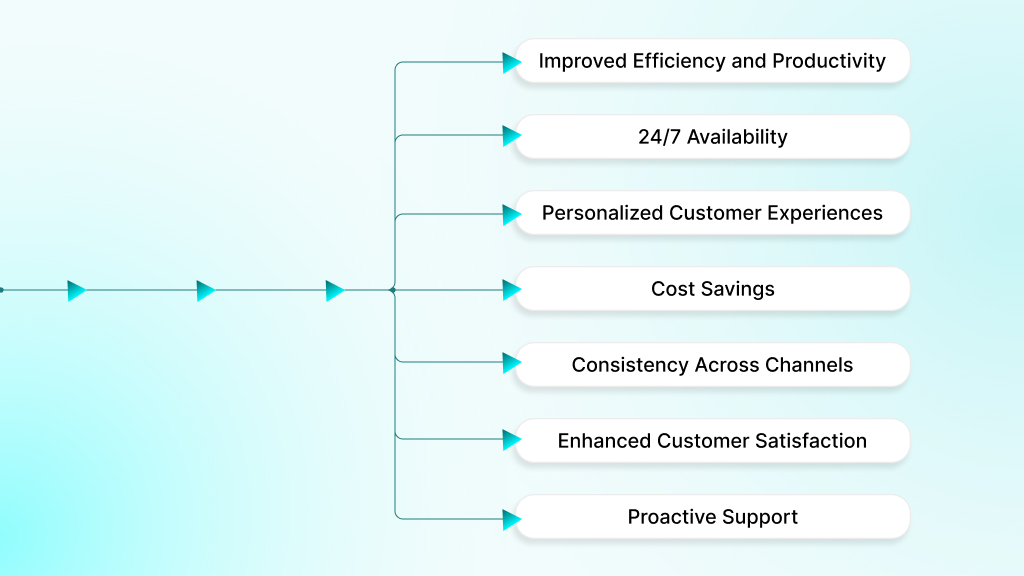
As businesses increasingly integrate AI customer service solutions into their operations, the benefits are becoming clear. AI-driven technologies are not just about automating routine tasks; they are about creating better customer experiences, reducing costs, and improving operational efficiency.
Here is a closer look at the benefits of AI customer service solutions.
1. Improved Efficiency and Productivity
AI customer service solutions allow companies to manage a higher volume of customer interactions without the need for additional staff. By automating repetitive tasks like order tracking, answering FAQs, and updating accounts, AI allows human agents to focus on more intricate or high-priority customer issues.
Companies that deploy AI in customer service report productivity increases of 20 to 30%. This improvement is due to the ability of AI to quickly resolve simple inquiries and handle repetitive tasks, allowing customer service teams to operate more efficiently.
2. 24/7 Availability
AI customer service solutions provide around-the-clock support. Chatbots, virtual assistants, and AI agents do not require breaks, meaning that customers can receive assistance at any time, even outside of business hours.
This is beneficial for companies with a global customer base, as AI can ensure that customers in different time zones are not left waiting for responses.
3. Personalized Customer Experiences
AI customer service solutions go beyond generic responses by tailoring interactions based on customer history, preferences, and behavior. Using machine learning algorithms, AI can analyze past purchases, interactions, and even social media data to provide personalized recommendations and responses.
For example, Amazon’s AI-powered recommendation engine suggests products based on past purchases, search history, and preferences.
4. Cost Savings
AI customer service solutions can significantly lower operational costs by automating routine tasks.
Gartner predicts that conversational AI will reduce contact center agent labor costs by $80 billion by 2026, highlighting the significant savings businesses can achieve by incorporating AI into their support strategies.
5. Consistency Across Channels
AI ensures that customers receive consistent responses and experiences, regardless of the communication channel. Whether interacting via chat, email, phone, or social media, AI-powered tools can provide uniform support, ensuring the brand voice remains consistent and customer issues are addressed efficiently.
6. Enhanced Customer Satisfaction
When customers receive fast, accurate, and personalized service, they are more likely to be satisfied with their experience. AI’s ability to reduce response times, handle more inquiries, and resolve issues proactively has a direct impact on customer satisfaction scores (CSAT).
By providing real-time support and personalized interactions, AI tools help businesses meet customers’ rising expectations, resulting in higher customer satisfaction and loyalty.
7. Proactive Support and Problem Resolution
AI can predict when customers might encounter issues, such as service interruptions or upcoming product renewals, and reach out proactively to offer assistance or a solution. This proactive approach prevents customer frustrations and helps resolve issues before they escalate into complaints.
For example, a telecommunications company might use AI to monitor service usage patterns and automatically notify customers when their data plan is nearing its limit, or suggest an upgrade if their current plan does not meet their needs.
AI customer service solutions can improve efficiency and reduce costs, as highlighted in DEVtrust’s Financial Chatbot, which provides real-time financial data and insights. With a user-friendly interface and integrated AI tools, the Financial Chatbot helps investors make informed decisions, improving data access by 50%. [Read the full case study here]
Get in touch with DEVtrust to see how our AI-powered chatbots can optimize your customer service operations and improve engagement.
Key Use Cases of AI in Customer Service
AI customer service solutions are transforming how businesses interact with their customers by optimizing processes, enhancing engagement, and providing a level of personalization that was previously difficult to achieve.
Below are some of the most impactful use cases where AI is driving innovation and improving customer experiences.
1. AI Chatbots for Basic Queries and Self-Service
AI-powered chatbots handle simple inquiries like FAQs, order tracking, and account updates. By using Natural Language Processing (NLP), chatbots provide instant, accurate responses, reducing wait times and freeing up human agents for more complex tasks.
2. Ticket Management and Escalation
AI optimizes ticket management by automatically classifying, prioritizing, and routing support tickets based on their urgency. It also identifies when issues need to be escalated to human agents, ensuring that customers with complex or urgent concerns receive timely, expert support.
3. AI Agents for Autonomous Problem Solving
AI agents are capable of performing tasks autonomously, such as processing refunds, managing accounts, or resolving billing issues. These agents work in conjunction with other systems like CRMs to deliver timely solutions without human intervention, improving efficiency and reducing wait times.
4. Sentiment Analysis for Enhanced Customer Insights
Sentiment analysis tools assess the emotional tone of customer interactions. This allows businesses to anticipate customer satisfaction in real-time and adjust responses accordingly. For example, if a customer is frustrated, the system can flag the issue for faster resolution or escalate it to a human agent for a more empathetic approach.
5. Proactive Customer Support and Issue Prevention
AI customer service solutions do not just wait for customers to reach out; they can predict potential issues and proactively address them. By analyzing past customer interactions and identifying patterns, AI can foresee when a customer is likely to encounter a problem, whether it is a service interruption, a product issue, or an upcoming subscription renewal.
For example, AI can notify a customer about a potential issue with their account before the customer notices, offering a solution or alternative before the situation escalates.
6. Virtual Customer Assistants (VCAs)
More advanced than chatbots, VCAs manage complex, multi-step tasks such as troubleshooting or offering personalized product recommendations. They use machine learning to adapt and provide more relevant, efficient service, allowing for a seamless customer experience across channels.
7. Multilingual Support
As businesses expand into new regions, providing support in multiple languages becomes crucial. AI-powered multilingual support systems can automatically translate customer inquiries and responses, allowing businesses to cater to a global customer base without the need for a large team of multilingual agents.
Steps to Implement AI in Customer Service
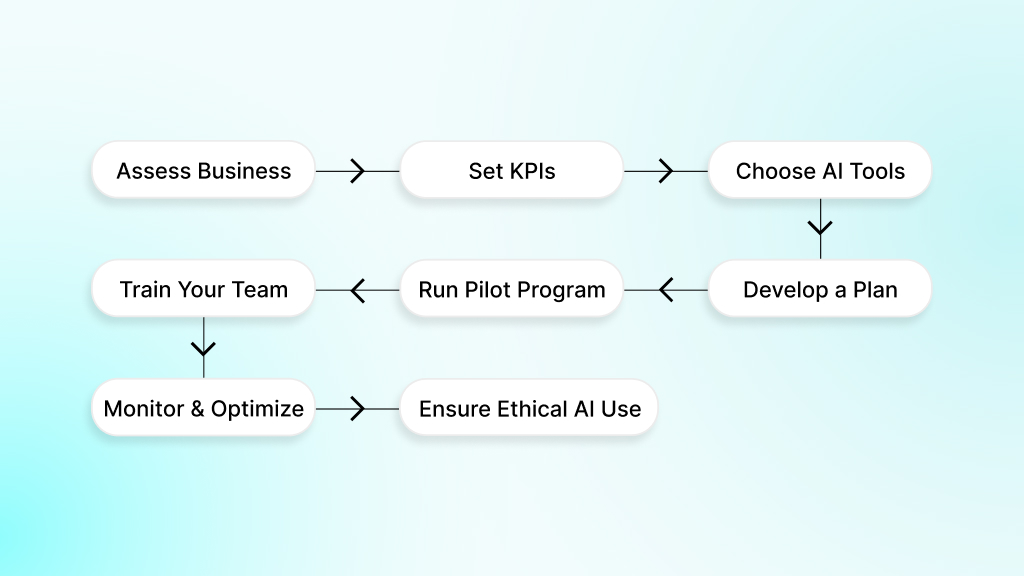
Integrating AI customer service solutions into your business is beneficial for customer support operations. However, to maximize their effectiveness, it is essential to follow a structured approach to implementation. Below are the key steps businesses should take when adopting AI to ensure successful deployment and continued success.
1. Assess Business Needs and Identify Pain Points
Before implementing AI, it is crucial to assess your business-specific needs and identify areas where AI can provide the most value. Start by examining current customer service challenges, such as long response times, high operational costs, or inconsistent service across channels. This will help pinpoint areas where AI can have the greatest impact.
2. Define Clear Objectives and Set KPIs
Establish clear goals for what you want to achieve with AI customer service solutions. Additionally, set Key Performance Indicators (KPIs) to measure success. Some potential KPIs include:
- Customer satisfaction scores (CSAT)
- Response time reductions
- First contact resolution rates
- Ticket volume reduction
Tracking these metrics helps to evaluate the success of the AI customer service solutions and adjust strategies as needed.
3. Choose the Right AI Tools and Platforms
The next step is to select the right AI tools that align with your objectives. There are various AI customer service solutions available, each with unique capabilities. When choosing an AI tool, consider the following factors:
- Integration: The AI tool should integrate seamlessly with existing customer service platforms like CRMs, ticketing systems, and communication channels (email, chat, etc.).
- Ease of Use: Look for tools that are easy for your team to use and customize. Many AI platforms offer no-code or low-code options to simplify deployment.
4. Develop a Comprehensive Plan for Integration
A successful AI implementation requires careful planning. Develop a roadmap that outlines how the AI tools will be integrated into your existing customer service workflows. Some key considerations include:
- Data Integration: Ensure that AI tools have access to necessary customer data (e.g., CRM data, historical interactions) to provide context and accurate responses.
- System Compatibility: Make sure the AI platform integrates with your existing systems, such as ticketing software, knowledge bases, and chat platforms.
- User Roles and Permissions: Define roles for both AI tools and human agents to avoid any workflow disruptions.
During this phase, it is also important to allocate resources for necessary infrastructure updates, such as server upgrades or data storage solutions.
5. Run a Pilot Program
Before rolling out AI across your entire customer service operation, it is crucial to run a pilot program. This allows you to test the tool and identify any potential issues, and gather feedback from both support agents and customers.
- Start Small: Implement AI in one specific area, such as handling basic FAQs or automating ticket routing.
- Gather Feedback: During the pilot phase, collect feedback from both customers and agents on the AI’s performance. What worked well? What could be improved? Use this feedback to fine-tune the system before a full rollout.
6. Train Your Team on AI Tools and Collaboration
While AI can automate many customer service tasks, human agents will still play a key role in providing high-quality support. Proper training ensures your team knows how to collaborate effectively with AI tools.
- Human-AI Collaboration: Train agents on when to transfer a conversation from AI to human intervention, especially for more complex or emotional cases.
7. Monitor and Optimize AI Performance
Once the AI solution is fully deployed, it is important to continually monitor its performance. Use the KPIs defined earlier to assess the effectiveness of the AI system in real-time. Track metrics like:
- Customer Satisfaction (CSAT): Are customers satisfied with the speed and quality of service provided by AI?
- Resolution Times: How quickly is AI resolving customer queries?
- Escalation Rates: How often are issues being escalated from AI to human agents?
Based on these insights, you can improve your AI solution by adjusting workflows, refining the AI’s learning algorithms, and even updating the system to handle new types of queries.
8. Ensure Ethical AI Use and Data Privacy Compliance
As AI customer service solutions handle more customer data, it is essential to ensure that the systems comply with data privacy regulations like GDPR and CCPA. Additionally, transparency with customers about how their data is being used builds trust and ensures a responsible approach to AI implementation.
Challenges and Solutions for AI in Customer Service
While AI customer service solutions offer significant benefits, businesses must manage several challenges to ensure effective implementation and long-term success. By addressing these challenges with the right strategies, companies can maximize the value of AI while maintaining high-quality customer service.
1. Handling Complex Customer Queries
AI excels at handling routine tasks but can struggle with complex or nuanced customer inquiries. Issues that require empathy, contextual understanding, or specialized knowledge are best handled by human agents.
Solution: Implementing clear escalation protocols ensures that AI knows when to pass on difficult cases to a human for resolution.
2. Trust and Reliability
The reliability of AI depends on the quality of the data it is trained on. If the AI system is trained with biased or incomplete data, it may provide incorrect or inadequate responses.
Solution: Regular audits and continuous training are essential to ensure that AI systems offer accurate, reliable solutions.
3. Data Privacy Concerns
AI systems process large amounts of sensitive data, which raises concerns about privacy and security.
Solution: Ensure AI tools comply with privacy regulations like GDPR and CCPA and inform customers about how their data is being used in AI-driven systems.
4. Integration with Legacy Systems
Integrating AI with existing customer service platforms, such as CRM systems or ticketing software, can be complex. Legacy systems may not be compatible with modern AI tools, and the integration process can be resource-intensive.
Solution: Plan for seamless integration by selecting AI tools that are compatible with existing systems. Consider phased rollouts and pilot programs to identify and resolve integration issues before full-scale deployment.
5. High Initial Investment
While AI customer service solutions provide long-term savings, the initial setup can be costly. Expenses related to AI software, data infrastructure, training, and integration can strain budgets, especially for smaller businesses. A clear ROI plan and pilot programs can help businesses manage this investment and assess the technology’s impact.
Solution: Start with a pilot program and a clear ROI plan to assess the value of AI tools. Focus on high-impact areas, such as automating basic inquiries, to quickly realize cost savings and operational efficiency.
The Future of AI in Customer Service
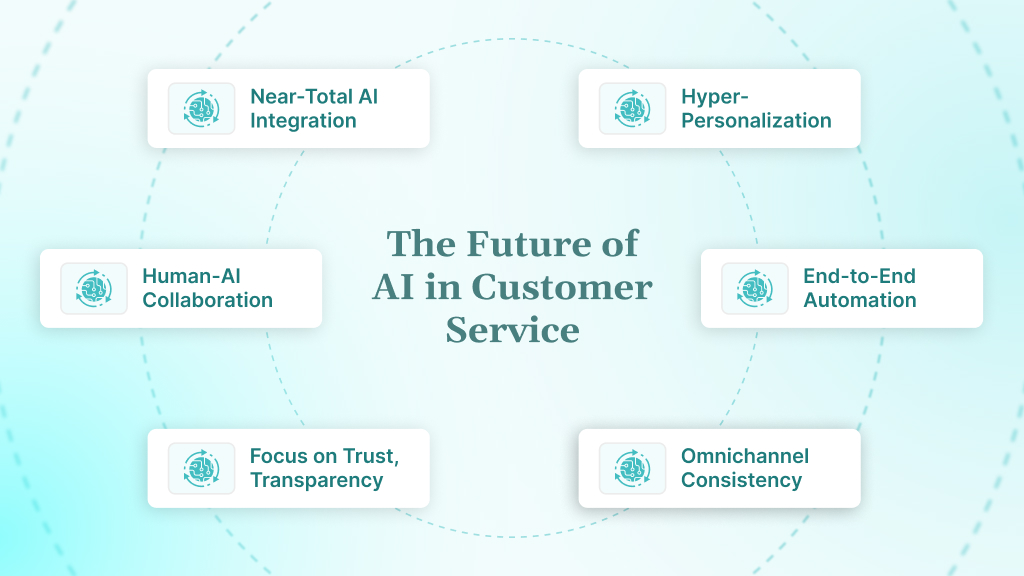
The future of AI customer service solutions is filled with exciting possibilities, with AI technology set to redefine how businesses interact with customers. Here is a glimpse into the future of AI in customer service:
1. Near-Total AI Integration
AI is set to handle around 95% of all customer interactions (both voice and text) by 2025, with 80%of customer service and support organizations expected to use generative AI to enhance agent productivity and the overall customer experience. This shift allows companies to provide seamless, 24/7 support at scale.
2. Hyper-Personalization and Proactive Experiences
Next-generation AI utilizes real-time data, sentiment analysis, and predictive analytics to deliver hyper-personalized support. AI systems anticipate customer needs and deliver relevant solutions before customers even articulate an issue, elevating satisfaction and loyalty.
3. Human-AI Collaboration
Rather than replacing human agents, AI will augment them. Virtual agents will handle routine and repetitive queries, and human agents will focus on more complex, sensitive, or emotionally charged issues. AI will assist human agents with real-time suggestions, context-aware support, and sentiment analysis, helping them offer more empathetic, nuanced service.
4. End-to-End Automation
AI-driven automation is extending far beyond chatbots. Advanced AI now streamlines internal workflows, including tasks like billing issues, scheduling, and technical troubleshooting. It integrates seamlessly with ERP/CRM platforms and even dynamically updates self-service resources.
5. Focus on Trust, Transparency, and Privacy
As AI becomes a central part of customer service, businesses are increasingly prioritizing data privacy, transparency, and trust. Customers expect brands to balance personalization with respect for privacy, which is prompting companies to ramp up their investment in ethical AI governance.
6. Omnichannel Consistency
AI will unify customer interactions across all channels, web, mobile, social media, and even in-store, ensuring a consistent, cohesive service experience. By integrating AI across multiple platforms, businesses can provide customers with a seamless journey regardless of where the interaction takes place.
Conclusion
As AI customer service solutions continue to evolve, they are reshaping the future of customer interactions. From near-total AI integration that handles nearly all customer inquiries to hyper-personalized, proactive support, AI is optimizing the way businesses engage with their customers.
Integrating AI into your customer service system can be complex, but with the right guidance, it is incredibly rewarding. DEVtrust specializes in helping businesses seamlessly implement AI solutions to automate and optimize customer interactions.
DEVtrust’s AI chatbots have successfully transformed customer service experiences, whether it is improving information accessibility, enhancing user engagement, or offering personalized solutions. Our Health Bot and Financial Chatbot are just a few examples of how we are driving success through AI.
Ready to achieve similar results for your business? Contact DEVtrust to get started on your AI customer service solution today!
AI in Customer Service: Everything You Need to Know
Learn about AI customer service solutions. From AI chatbots to personalized support, learn how startups can optimize customer communications with AI tools.
Contact Us